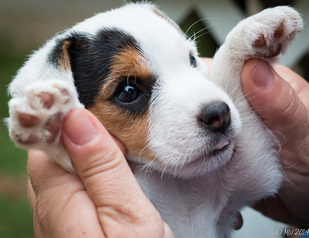Training Tips
Do you recommend using a crate for house training a puppy and why?

The crate is a wonderful training aid and is an invaluable tool when used properly during the house-training phase. It is instinctive for a puppy not to soil his nest. The idea behind using a crate as an aid to house training is that your puppy will consider the crate as his nest. He will eat and sleep in the crate, so therefore will make every attempt to keep it clean. It is important that the crate be only large enough for the puppy to comfortably lie down. If it is too large an area, the puppy may sleep at one end and eliminate at the other. If you purchase a crate that will fit your terrier as an adult, I recommend blocking off part of it during the house-training stage. A cardboard box works well for this. A suggested schedule for crate training is included in your Puppy Packet that you can modify to work with your personal schedule. When introduced the right way, the crate becomes a safe haven for your puppy and protects both your house and the puppy during the times you can’t attend him. The crate is also the safest way to travel with your dog both as a puppy and an adult.
Are Jack Russells easily trained?
Most Jack Russells love to learn, are eager to please, and are extremely food-motivated, which makes for easy training. Whether your goal is for your dog to work in the field, perform in the show ring, or simply to have good house manners, training provides the mental and physical stimulation this breed so requires.
As a general rule, I would say that Jack Russells do best with a positive approach to training. By using positive reinforcement methods, training becomes a shared activity for you and your dog, establishing a mutual respect between the two of you.
Using the right approach, there isn’t anything this extremely intelligent breed can’t learn. I highly recommend enrolling in a basic puppy obedience class. These classes are fun and are useful for helping your dog learn to behave in the face of distractions, such as other dogs. They provide an excellent opportunity to learn the socialization skills so crucial in a puppy’s young life. To find classes offered in your area, check out The Association of Pet Dog Trainers.
As a general rule, I would say that Jack Russells do best with a positive approach to training. By using positive reinforcement methods, training becomes a shared activity for you and your dog, establishing a mutual respect between the two of you.
Using the right approach, there isn’t anything this extremely intelligent breed can’t learn. I highly recommend enrolling in a basic puppy obedience class. These classes are fun and are useful for helping your dog learn to behave in the face of distractions, such as other dogs. They provide an excellent opportunity to learn the socialization skills so crucial in a puppy’s young life. To find classes offered in your area, check out The Association of Pet Dog Trainers.
Can you give me some basic training tips to help ensure my JRT is easy to live with?

Because Jack Russells are such an intelligent breed, if you don’t establish right from the start that you are the pack leader, they’re liable to end up training you before you train them. It’s important to establish house rules from the beginning and be firm in sticking to them. If the dog won’t be allowed on the furniture as an adult, then don’t let him on the furniture as a puppy. If you don’t want your dog begging at the dinner table, then don’t toss him tidbits while you’re eating. If you don’t want a pushy dog, then don’t reinforce attention-getting behavior like nudging, pawing, and barking. Give the dog attention on your terms, not his. Have the dog sit or obey some other command to “earn” your attention and petting. Can your dog be trusted to have run of the house without supervision? If not, crate him while you are out and don’t give him the opportunity to be naughty. Jack Russells can make wonderful house dogs if you provide them with plenty of exercise, strong leadership, and good house rules to live by.
